Daily Vocabulary Words: List of Daily Used Words in Leading International Newspapers
Hi there. Welcome to this special section @ Wordpandit.
Our endeavour here is very simple: to highlight important daily vocabulary words, which you would come across in leading newspapers in the country. We have included the following newspapers in our selection:
• The New York Times
• The Washington Post
• Scientific American
• BBC
• The Guardian
• Psychology Today
• Wall Street Journal
• The Economist
We are putting in extensive work for developing your vocabulary. All you have got to do is be regular with this section and check out this post on a daily basis. This is your repository of words that are commonly used and essentially, we are posting a list of daily used words. Hence, this has significant practical application as it teaches you words that are used commonly in leading publications mentioned above.
Visit the website daily to learn words from leading international newspapers.
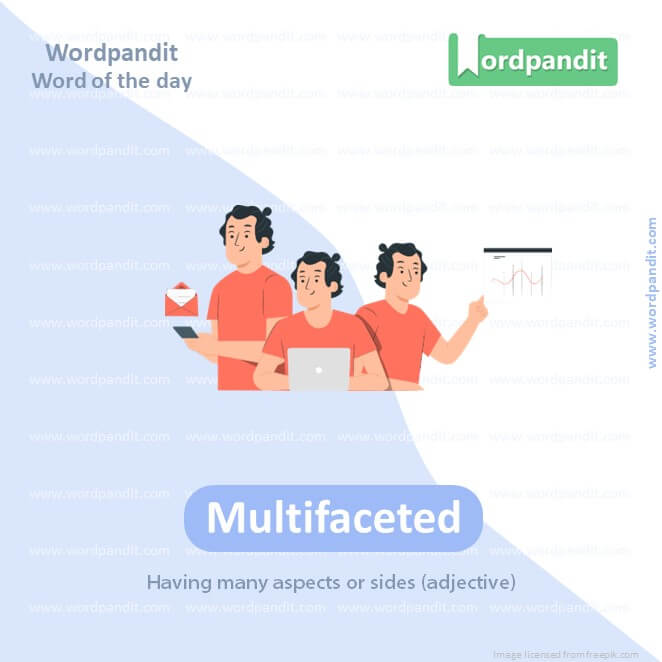
WORD-1: Multifaceted
CONTEXT: Music is a multifaceted sensory modality, by which many factors are combined to create an experience. Music has long been understood and utilized to induce communal bonding and emotional states. But how does an auditory experience allow such depth in human response? In this blog, we will explore the multiple factors at play that allow music to influence prosocial behavior.
SOURCE: Psychology Today
EXPLANATORY PARAGRAPH: Imagine a shiny gem with lots of different sides. Each side shows a different sparkle. Just like that gem, when something is multifaceted, it has many parts or sides. It means there are lots of different ways to look at it or it can do many different things.
MEANING: Having many aspects or sides (adjective).
PRONUNCIATION: mul-ti-fa-set-ed
SYNONYMS: Versatile, Complex, Diverse, Varied, Many-sided, Intricate, Compound.
USAGE EXAMPLES:
1. She is a multifaceted artist, skilled in painting, singing, and dancing.
2. The multifaceted problem requires a solution that addresses all its aspects.
3. Our city’s culture is multifaceted, with influences from around the world.
4. The debate was multifaceted, covering a range of topics.
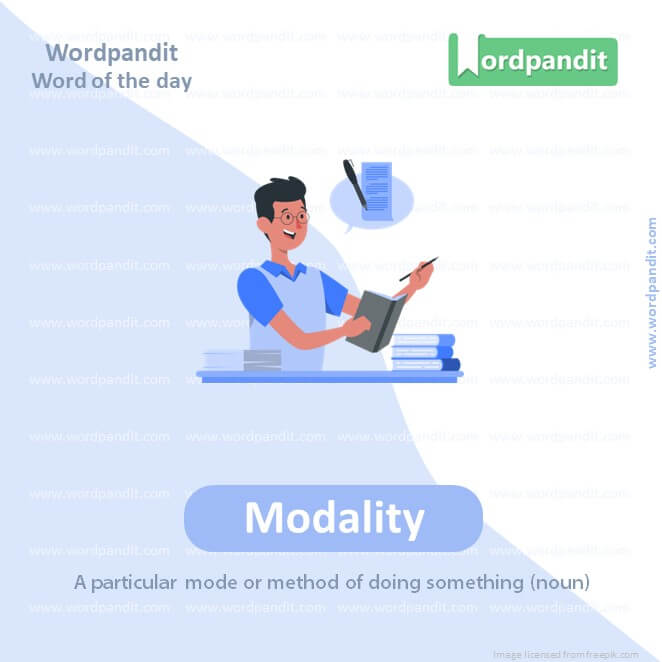
WORD-2: Modality
CONTEXT: Music is a multifaceted sensory modality, by which many factors are combined to create an experience. Music has long been understood and utilized to induce communal bonding and emotional states. But how does an auditory experience allow such depth in human response? In this blog, we will explore the multiple factors at play that allow music to influence prosocial behavior.
SOURCE: Psychology Today
EXPLANATORY PARAGRAPH: Think of modality like a special way or method of doing something. For example, when you talk, you use words, but when you wave, you use your hand. Both talking and waving are different modalities or ways of saying hello.
MEANING: A particular mode or method of doing something (noun).
PRONUNCIATION: mo-dal-i-ty
SYNONYMS: Method, Mode, Approach, Technique, Manner, Means, Procedure.
USAGE EXAMPLES:
1. In language learning, different modalities like listening and speaking are important.
2. The therapist used various modalities to treat the patient.
3. Teaching students through multiple modalities helps in better understanding.
4. The modality of communication has shifted greatly with technology.
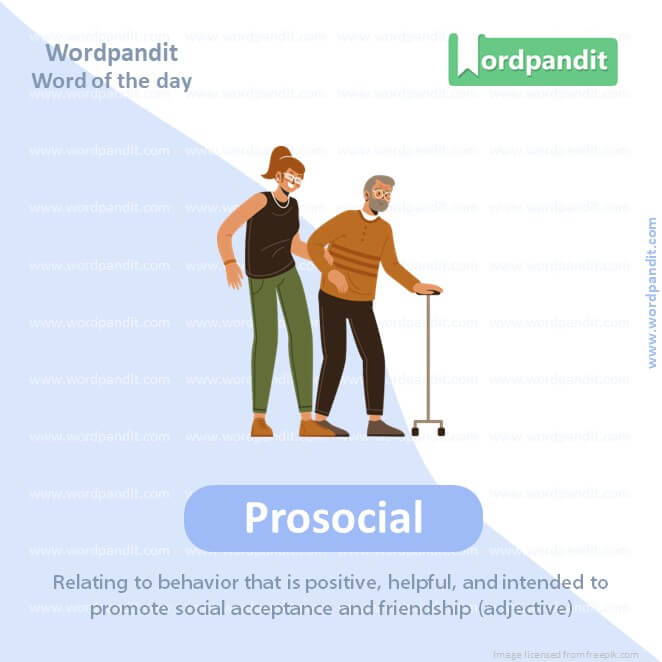
WORD-3: Prosocial
CONTEXT: Music is a multifaceted sensory modality, by which many factors are combined to create an experience. Music has long been understood and utilized to induce communal bonding and emotional states. But how does an auditory experience allow such depth in human response? In this blog, we will explore the multiple factors at play that allow music to influence prosocial behavior.
SOURCE: Psychology Today
EXPLANATORY PARAGRAPH: Prosocial is when someone does something nice or helpful for others. Like sharing your toys with a friend or helping someone who fell down. It’s about being kind and caring towards others.
MEANING: Relating to behavior that is positive, helpful, and intended to promote social acceptance and friendship (adjective).
PRONUNCIATION: pro-so-shul
SYNONYMS: Altruistic, Beneficial, Charitable, Cooperative, Kind, Compassionate, Helpful.
USAGE EXAMPLES:
1. Prosocial behavior, like sharing, is encouraged in schools.
2. She received an award for her prosocial activities in the community.
3. Volunteering is a form of prosocial behavior.
4. The study focuses on children’s prosocial development.
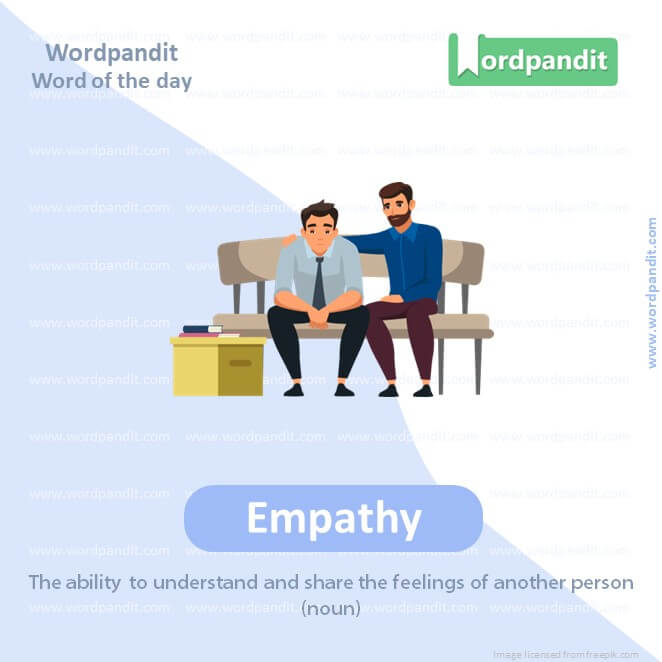
WORD-4: Empathy
CONTEXT: Because the sympathetic nervous system activates during music listening from the time we are young, an association builds between music listening and physiological responses, which we conceptualize as emotional reactions. Further, musically induced emotions are felt just as strongly as other emotions. This explains how listening to prosocial songs, which advocate for positive communal interactions, can promote empathy, and reduce aggression, prejudice, and discrimination.
SOURCE: Psychology Today
EXPLANATORY PARAGRAPH: Empathy is like having superpowers to feel what someone else is feeling. If your friend is sad and you feel sad too, that’s empathy. It’s understanding and sharing the feelings of others.
MEANING: The ability to understand and share the feelings of another person (noun).
PRONUNCIATION: em-puh-thee
SYNONYMS: Understanding, Compassion, Sympathy, Sensitivity, Warmth, Insight, Tenderness.
USAGE EXAMPLES:
1. She showed great empathy towards her friend who lost his pet.
2. Empathy is important for building strong relationships.
3. Teachers need empathy to understand their students’ problems.
4. Reading fiction can increase a person’s empathy.
WORD-5: Prejudice
CONTEXT: Because the sympathetic nervous system activates during music listening from the time we are young, an association builds between music listening and physiological responses, which we conceptualize as emotional reactions. Further, musically induced emotions are felt just as strongly as other emotions. This explains how listening to prosocial songs, which advocate for positive communal interactions, can promote empathy, and reduce aggression, prejudice, and discrimination.
SOURCE: Psychology Today
EXPLANATORY PARAGRAPH: Prejudice is when someone decides they don’t like something or someone without a good reason. It’s like deciding you don’t like broccoli without ever trying it. Prejudice isn’t fair because it’s judging without understanding.
MEANING: Preconceived opinion that is not based on reason or actual experience (noun).
PRONUNCIATION: prej-uh-dis
SYNONYMS: Bias, Discrimination, Intolerance, Bigotry, Partiality, Preconception, Stereotype.
USAGE EXAMPLES:
1. The campaign was aimed at reducing racial prejudice in society.
2. Prejudice against certain groups can lead to unfair treatment.
3. His decisions were often influenced by his personal prejudices.
4. Education is key to overcoming prejudice.
WORD-6: Interwoven
CONTEXT: Literature and doctoring have long been interwoven for me. During my residency in internal medicine at Los Angeles County-USC Medical Center, I began reading the work of the late, great Charles Bukowski, a local writer, major alcoholic, and literary limit pusher. At night, at home, I’d be reading his short stories like “Purple As An Iris”—his tales about countless involuntary ambulance trips to LA County Hospital. Invariably, on those trips, Bukowski would be cursing the EMTs through his bloody vomit and trying to fight them off as they attempted to stabilize him on the way to the emergency room (ER).
SOURCE: Psychology Today
EXPLANATORY PARAGRAPH: Imagine mixing different colors of playdough together until they’re all twisted and connected. That’s like interwoven. It means things are mixed or combined together so much that they become part of each other.
MEANING: Blended or laced together intricately (adjective).
PRONUNCIATION: in-ter-wo-vun
SYNONYMS: Intertwined, Entangled, Merged, Blended, Mixed, Entwined, Knitted.
USAGE EXAMPLES:
1. The story is interwoven with various themes and characters.
2. The fabric is made of interwoven threads of different colors.
3. Her life was interwoven with his, making separation difficult.
4. Traditions are often interwoven into cultural practices.
WORD-7: Involuntary
CONTEXT: Literature and doctoring have long been interwoven for me. During my residency in internal medicine at Los Angeles County-USC Medical Center, I began reading the work of the late, great Charles Bukowski, a local writer, major alcoholic, and literary limit pusher. At night, at home, I’d be reading his short stories like “Purple As An Iris”—his tales about countless involuntary ambulance trips to LA County Hospital. Invariably, on those trips, Bukowski would be cursing the EMTs through his bloody vomit and trying to fight them off as they attempted to stabilize him on the way to the emergency room (ER).
SOURCE: Psychology Today
EXPLANATORY PARAGRAPH: Involuntary is when you do something without thinking about it or deciding to do it. Like blinking your eyes or jumping when you hear a loud noise. You don’t plan it, your body just does it.
MEANING: Done without conscious control (adjective).
PRONUNCIATION: in-vol-un-tair-ee
SYNONYMS: Unintentional, Automatic, Unconscious, Reflex, Accidental, Spontaneous, Uncontrollable.
USAGE EXAMPLES:
1. An involuntary shiver ran through him in the cold.
2. Laughing can sometimes be an involuntary reaction.
3. Involuntary movements can occur during sleep.
4. The patient had involuntary muscle spasms.
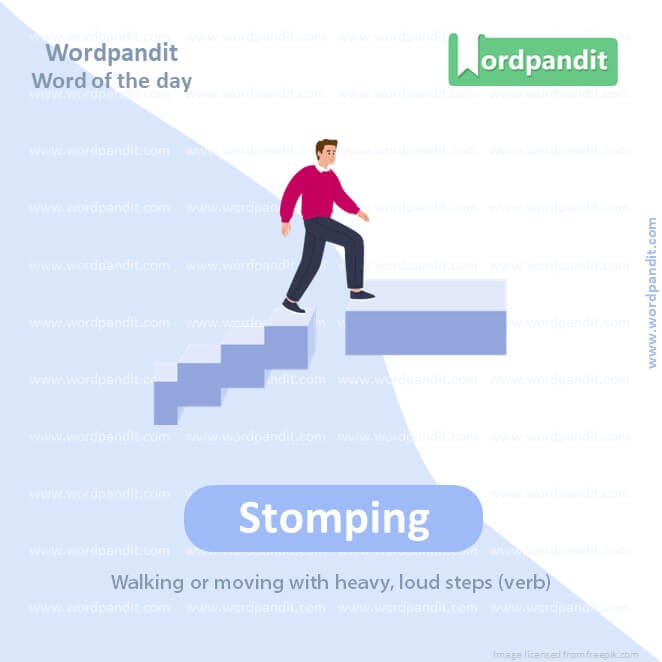
WORD-8: Stomping
CONTEXT: I imagined these patients we were treating to be his drinking buddies, men, and women emerging from his same stomping grounds. It allowed me to see them, if not in a more romantic way, to at least glimpse the humanity of these desperate souls. They’d roll in, assaultive, refuse medical treatment, quickly flee the hospital, and then, invariably reappear soon thereafter as they circled the drain of their lives.
SOURCE: Psychology Today
EXPLANATORY PARAGRAPH: Stomping is like stepping really hard on the ground, making a loud noise. Imagine you’re pretending to be a giant and you step heavily so everyone can hear you coming. That’s stomping.
MEANING: Walking or moving with heavy, loud steps (verb).
PRONUNCIATION: stomp-ing
SYNONYMS: Tramping, Stamping, Clomping, Trudging, Plodding, Tromping, Thundering.
USAGE EXAMPLES:
1. He was stomping around the room angrily.
2. The children were stomping in the puddles, splashing water everywhere.
3. You could hear the stomping of feet upstairs.
4. The dancers were stomping to the beat of the drum.
WORD-9: Glimpse
CONTEXT: I imagined these patients we were treating to be his drinking buddies, men, and women emerging from his same stomping grounds. It allowed me to see them, if not in a more romantic way, to at least glimpse the humanity of these desperate souls. They’d roll in, assaultive, refuse medical treatment, quickly flee the hospital, and then, invariably reappear soon thereafter as they circled the drain of their lives.
SOURCE: Psychology Today
EXPLANATORY PARAGRAPH: A glimpse is like a quick peek or a very short look at something. Imagine you see a butterfly for just a second before it flies away. You didn’t see it for long, just a quick glimpse.
MEANING: A brief or quick view of something (noun).
PRONUNCIATION: glimp-s
SYNONYMS: Peek, Glance, Look, View, Sight, Gander, Quick Look.
USAGE EXAMPLES:
1. I caught a glimpse of the deer before it ran into the woods.
2. She only had a brief glimpse of the painting.
3. Through the crowd, he got a glimpse of the celebrity.
4. The documentary offers a glimpse into the lives of the famous.
WORD-10: Invariably
CONTEXT: I imagined these patients we were treating to be his drinking buddies, men, and women emerging from his same stomping grounds. It allowed me to see them, if not in a more romantic way, to at least glimpse the humanity of these desperate souls. They’d roll in, assaultive, refuse medical treatment, quickly flee the hospital, and then, invariably reappear soon thereafter as they circled the drain of their lives.
SOURCE: Psychology Today
EXPLANATORY PARAGRAPH: Invariably means something always happens in the same way. Like how the sun always rises in the morning and sets in the evening. It doesn’t change; it’s always the same.
MEANING: In every case or on every occasion; always (adverb).
PRONUNCIATION: in-vair-ee-uh-blee
SYNONYMS: Always, Constantly, Continually, Perpetually, Unfailingly, Consistently, Regularly.
USAGE EXAMPLES:
1. She invariably arrives early to meetings.
2. The outcome of the experiment was invariably the same.
3. His response to the question is invariably witty.
4. The train is invariably crowded during rush hour.
Vocabulary SSC
Navigating the path to success in competitive examinations like the Staff Selection Commission (SSC) triggers a keen focus on ‘vocabulary SSC’. This collection of words, often prominent in SSC examinations, holds paramount importance, and forms a significant part of a candidate’s linguistic preparation. However, mastering ‘vocabulary SSC’ is a process that requires deliberate strategy and dedication.
To begin the journey with ‘vocabulary SSC’, a structured learning regime is key. Break the learning process into manageable chunks. Concentrate on a set number of words each day. This steady, consistent approach reduces the risk of burnout and enhances long-term retention of vocabulary.
The strategic use of memory aids can significantly boost the learning of ‘vocabulary SSC’. Utilize flashcards, memory apps, or even create personal mnemonics to help remember each word and its meaning more effectively. Associating a word to a personal event or object creates a lasting mental connection, making recall easier.
To truly master ‘vocabulary SSC’, it’s crucial to engage with the words in different contexts. Incorporating the words into daily reading and writing practices provides exposure to their usage in varied situations. This practical application reinforces the understanding of ‘vocabulary SSC’, enhancing the ability to employ these words accurately in the exam setting.
Regular revision is a must when preparing ‘vocabulary SSC’. Spaced repetition, interspersing the study with regular breaks, and regularly revisiting the words learned, ensures the words stay firm in your memory, ready to use when needed.
In essence, preparing ‘vocabulary SSC’ is an exercise in action-oriented constant learning. Strategic use of learning tools, practical application, and regular revision are key aspects of getting a grip on ‘vocabulary SSC’. As you stride through this process, you inch closer to acing your SSC examinations with an enriched vocabulary and boosted confidence.







